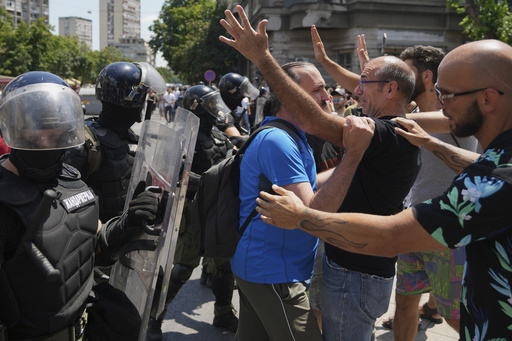In Belgrade, Serbia, tensions escalated as police forcefully removed street barricades erected by protestors as an expression of their ongoing opposition to President Aleksandar Vucic’s government. These demonstrators are calling for the release of numerous individuals, including university students, who were detained following a significant rally over the weekend. They stand accused of either confronting law enforcement or conspiring to usurp power.
Capital law enforcement officials dismantled metal barricades and cleared debris obstructing roads in Belgrade’s Zemun neighborhood. At these locations, dozens of protestors, with their hands in the air, voiced anti-government chants. Police officers adorned in riot gear were deployed across various central locations as the protestors moved from one intersection to another. Changing their strategy, protestors in Zemun began to walk persistently across pedestrian crossings, thereby disrupting traffic, before reconstructing the barricades later in the day.
Numerous individuals faced arrest, and footage captured police carrying a young man by his limbs into a van. The roots of this discord stretch back to a canopy collapse at a train station last November, which resulted in 16 fatalities. A large portion of Serbia’s populace attributes the catastrophe to perceived corruption and negligence in state-led infrastructure initiatives.
In response to these sentiments, throngs of demonstrators impeded traffic in various locales in Belgrade and other regions, including a pivotal bridge over the Sava River on Sunday night. Police acted swiftly to clear these obstructions on Monday morning. Videos on social media illustrate police vehicles speeding through a blockade in Belgrade, causing panic among the present individuals.
While visiting Spain, Vucic commended the police efforts, stating that the government possesses the necessary strength to uphold law and order. On Saturday, an assembly led by students attracted tens of thousands, demanding prompt parliamentary elections with aspirations of unseating Vucic’s right-wing government. Post-rally, confrontations between protestors and police led to the detention of many demonstrators. Vucic rejected calls for early elections, which are anticipated in 2027, alleging that university affiliates inciting these daily protests are engaging in acts of “terror” and attempting to destabilize the nation.
The European Parliament’s representative for Serbia, Tonino Picula, highlighted that while students seek justice for the previous tragedy and early polls, Vucic’s regime amplifies oppression. During his stay in Spain, Vucic voiced gratitude toward Russia for understanding the protests as a foreign-driven “color revolution,” though he has yet to supply proof of international meddling.
Critics argue that Vucic has transitioned into a more authoritarian ruler over the past decade, diminishing democratic liberties while allegedly enabling a culture of corruption and organized crime. Despite aspirations for European Union membership, Vucic’s administration maintains strong ties with Russia and China.


